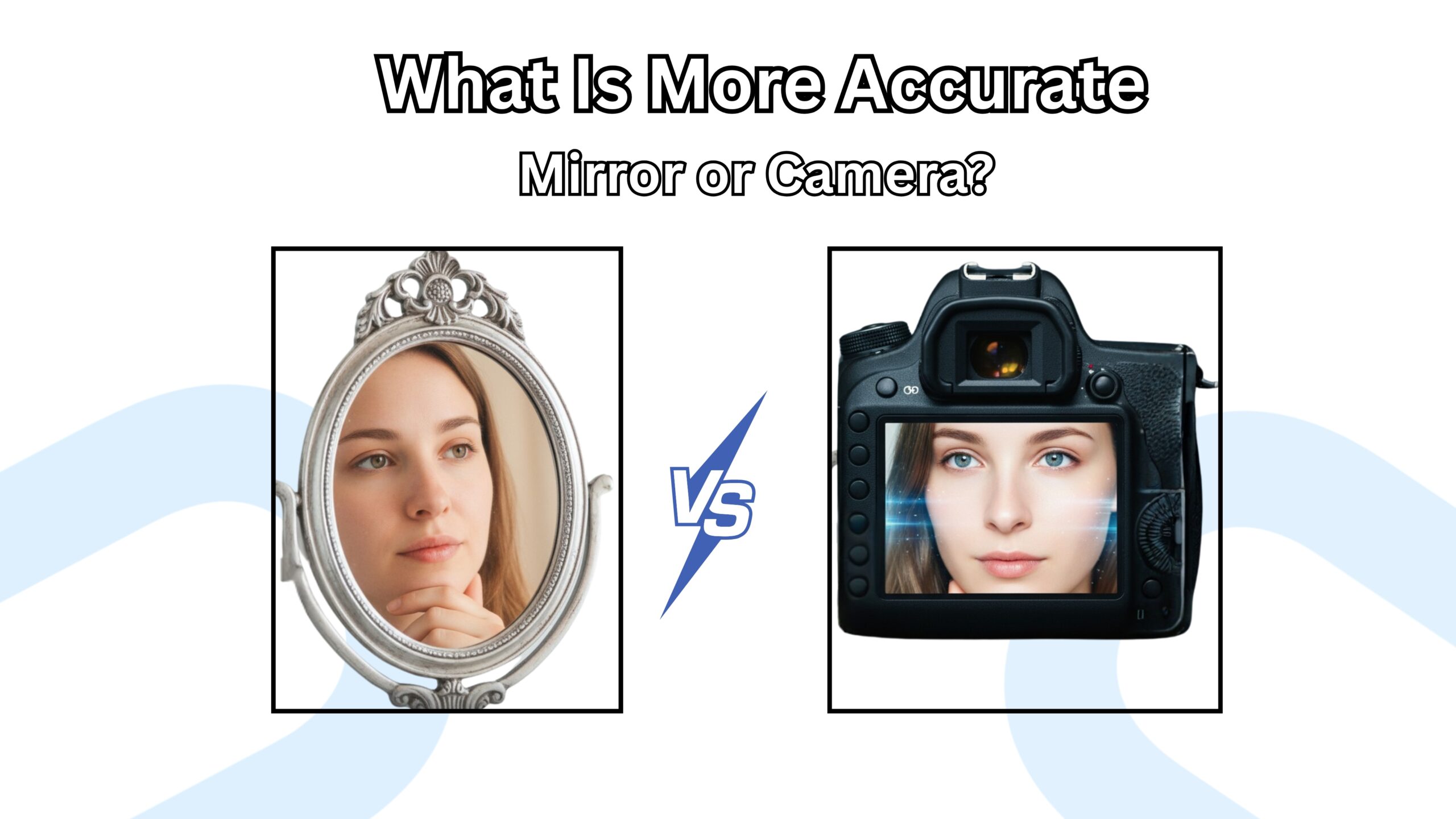What is actually more accurate mirror or a camera? It’s downright confusing when you take a look in the mirror and see one person and a photo and see another.
The simple, easy answer is that they are both accurate but show you in different ways. Mirror shows you yourself flipped, a familiar image of yourself.
The camera shows you an unflattering, more true-to-life image of yourself to everyone else, but it too can alter how you appear. Let’s dive into why this occurs and work to get to the truth about your image.
The Mirror’s Reflection: A Familiar, Flipped Reality

What you’re looking at is an inverse image of yourself. This is often called a flipped image.
For example, if you wink your right eye in the mirror, the reflection will represent one winking their left eye, because this is the opposite eye.
This is the most important difference between a mirror and a camera. Because you see a flipped image of yourself every day, you become accustomed to the flipped image of yourself.
That is, you have these exchanges of your reflection while brushing your teeth, fixing your hair, washing your face, etc.
Each time you see your reflection, it confirms to you that what you are seeing is what you are now accustomed to, which we call the “real you.”
There is a simple explanation for this feeling that is actually scientific, called the “mere-exposure effect.” The idea is that we are attracted to familiarity.
Since we see ourselves in the mirror all the time, we have become more accustomed to that image of ourselves compared to the image on film.
You are completely accustomed to your asymmetry in its conceived flipped form.
When the camera takes your true self – your unflipped self – that same asymmetry seems strange and out of place, which is often why we feel we look ‘off’ or ‘weird’ in pictures.
So, is the mirror accurate? Yes, it is. It is simply because it is showing you an accurate portrayal of a never-taken flipped image; it is an honest look at your perceived flipped self, fantastic for grooming and looking at yourself in literal 3D, but not what the outside world will see when looking at you.
This is where the camera comes in. The mirror, as a friend we are used to, the camera can often feel like a harsher critic. The question is why? Let’s explore the camera’s side now.
The Camera’s View: How Others Really See You

A camera does not present a mirrored image because it records a non-reversed image.
This is often referred to as a “true image” because it is how you appear to everyone else looking at you in real life, and this is likely the biggest reason for the shock we get when we see a photo of ourselves.
When your friend is looking at you, they see your unflipped face.
A photo captures that same view, so with regard to orientation, a camera is more accurate at showing you how you look to other people. But that is not the whole story. Many other factors are making a camera less accurate.
An important consideration is focal length. A camera’s focal length influences how it flattens an image versus how it squishes an image.
Professional portrait photographers often use a lens with a focal length of 50mm or 85mm for these images because those focal lengths will translate faces to proportions that are very similar to how the human eye sees.
Your phone camera has a much wider focal length. This can make your face appear wider or rounder than it really is.
So, although the image is unflipped, the proportions might feel slightly off.
Lighting and angles have a large impact as well. A single bright light overhead can create dark shadows under your eyes and down your nose.
Likewise, a low angle will make your chin and neck look larger. A camera does not observe as ours do; our eyes adjust, whereas the camera captures whatever is present.
Getting the lighting and angles right does take effort. This is why professional photographers and companies have an entire industry dedicated to photo retouching service professionals to assist with lighting and angles to best represent the individual.
Having given some thought to these technical aspects of both, it is clear that there is no straightforward answer to the question of which is more accurate, a camera or a mirror.
Mirror vs. Camera: A Head-to-Head Comparison

Let’s find the main difference between a mirror and a camera. If we compare the two, this may help you better understand why you would trust one versus another. Below is a simple table that shows some comparisons of their basic aspects.
| Feature | Mirror | Camera |
| Image Orientation | Flipped / Reversed | True / Unflipped |
| Dimensionality | 3D Representation | 2D Representation |
| Common Distortions | Minimal (Glass Quality) | Lens Distortion, Focal Length, Angle |
| Perception | Your Familiar Self-Image | How the World Sees You |
| Best For | Grooming, Real-time Feedback | Capturing a Moment, Sharing |
We can further examine what the table reveals. The mirror is your personal, habitual view, and it primarily shows you an image that is reversed to create a 3D experience of depth.
It is a reliable source for day-to-day uses, such as double-checking to ensure there is no food in your teeth.
The camera, however, provides a view of the world. The camera reveals a true image orientation, which is how others see you. Yet, technology can alter that view.
A mirror accurately reflects a reversal of the world you are looking at. The camera accurately captures that moment in a flat, 2D manner from the viewer’s perspective.
The confusion arises from the fact that they should look the same even though each is trying to achieve something completely different.
Conclusion:
Now that we can answer the question. There is really no sense in thinking of one as “more” accurate than the other; they are both accurate in quite different ways.
The mirror displays an accurate flipped image, a version of you that you are familiar with and comfortable recognizing.
It is you, in your reality, in 3D, and in your sense of the world. The camera displays an accurate, unflipped image of you, a version of you that the world sees.
Cameras, of course, portray you in 2D depending on the lens and the lighting, or ever-changing technology that mediates images of you.
So the final judgment on the question of what is more accurate or less accurate, a mirror or a camera, can only conclude that the most “true” reflection of you lies somewhere in between the two images.
The challenge is to understand the differences. Most of us feel “wrong” in photographs because of what psychologists call the mere-exposure effect, as well as basic technical visual tricks cameras use to distort the images in front of us.
It’s not enough to believe that a bad photograph hurts your self-confidence. Your mirror self exists, and your camera self exists, and they are just two perspectives of the same person.
Through science, we can appreciate each view of ourselves, and importantly, we need to learn how to picture ourselves to best reflect you, so that we can begin to create photographs of you that you enjoy being in.
FAQs
Is the back camera on a phone significantly better at accuracy?
Yes, for the most part, a back camera is better. The lenses will be of better quality and less distorted.
Am I being captured “live” in a photo?
A photo captures the “live version” of you that others see, but it’s not the full experience. Bad lighting or an unusual angle will absolutely alter your look. A photograph is a 2D moment in time.
Why does my face appear uneven in pictures?
No human face is perfectly even. You’re simply habituated to seeing your unique characteristics in a flipped version in the mirror. Then, when you see the unflipped image, it may look odd to you.
Do mirrors deceive you?
A flat, regular mirror is always truthful to its senses. The only “deception” in a flat mirror is that it presents a reversed version of the world, not the same as everyone else sees.
Is a video more real than a photo?
A video may seem more real because you’re moving and talking, which is how you experience people looking at you more often. But it is through a camera lens, and that same distortion occurs.
How do famous people look so pretty in pictures all of the time?
They have a great deal of help! Professionals use expensive cameras with perfect lighting and lighting angles. And also, nearly all of those pictures will be somewhat touched up by a professional photo editing process.


